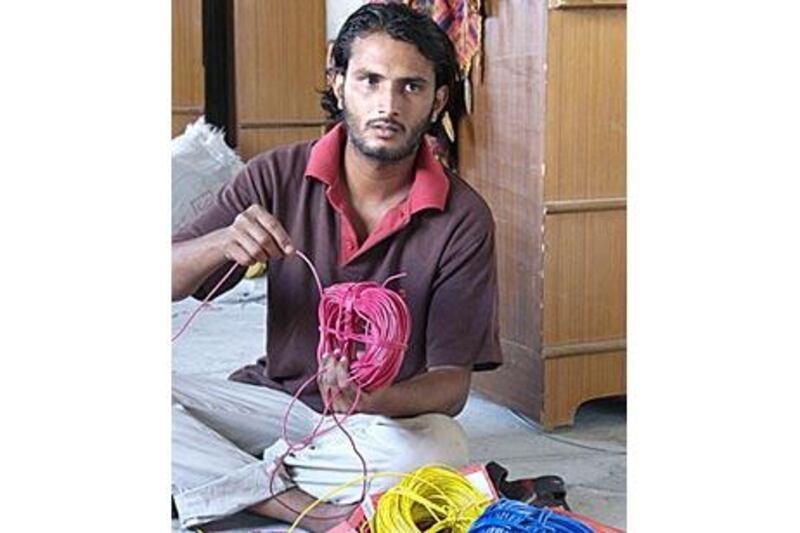NEW DELHI // Two separate bomb attacks in 2007 on Islamic places of worship that claimed the lives of 20 Muslims and which were blamed on Pakistani Islamists and Indian collaborators were possibly the work of Hindu radicals, investigators have said. Four men belonging to Hindu groups, who were arrested over the past fortnight, are now suspected to have been responsible for the May 2007 attack on Mecca Masjid in Hyderabad that killed 17 and the October 2007 attack on a shrine in Ajmer in Rajasthan, Ashwani Kumar, the director of India's Central Bureau of Investigation, said last week.
Mr Kumar said a Hindu activist named Sunil Joshi "played a key role in orchestrating the Ajmer blast". "A set of mobile Sim cards, which had been used in activation of the bomb-triggers in the Mecca Masjid blast [in May 2007], was used again in Ajmer blast," he said, Rajasthan's home minister, Shanti Dhariwal, said last week: "Four activists of the Abhinav Bharat and RSS have been arrested in the Ajmer case and we hope to arrest a few more of their accomplices who are hiding in the neighbouring states. We hope our investigation will also help crack some unsolved bomb cases, including that of Mecca Mosque, soon."
Police had been tipped off by a former Indian army officer, Lt Col Purohit, a Hindu who is himself on trial accused of involvement in 2008 bomb attacks in the predominantly Muslim textile town of Malegaon in which six Muslims were killed. The arrests and the officials' statements are being seen as vindication for Muslims, said those who were wrongly arrested and rights activists. "All along Muslim groups maintained that Hindu terrorists had been behind attacks in the mosque and the Muslim shrine, and Muslims were being unfairly targeted as suspects by communally biased police," said Zafarul Islam Khan, a Muslim community leader in Delhi.
Raeesuddin, a sales clerk at a Hyderabad diamond store who was charged along with 25 other Muslim suspects in the Hyderabad mosque attack and two other later bombings in the city, which claimed 55 lives, said: "While torturing us, police repeatedly said, 'Only Muslims could be terrorists.' Now, police should say sorry to us publicly and the government should compensate us properly. "All the police wanted was a confession that I was a terrorist and had taken part in bombing in the city. The degree of torture went up as I persisted that I was innocent," said 28-year-old Raeesuddin, who goes by one name and who now works as an electrician after losing a well-paid job because he was detained in jail for six months.
Although no Muslims were arrested in the Ajmer case, 26 young men from the minority community aged between 17 and 26 were detained for up to six months following the Hyderabad bombing. All the accused men were tortured "ruthlessly" by police, said an inquiry commission, constituting Hindu and Muslim rights activists, doctors and social workers, who visited them in the jail. Ibrahim Ali Junaid, who spent five months in jail wrongly accused in the Hyderabad bombing, said many of the men were given electrical shocks on their genitals.
"All sorts of third-degree torture methods were applied on us to coerce out a confession for the court, in their favour," Mr Junaid said. A court acquitted all the men of the charges in February 2008. "Over the past few years in many terror cases, hundreds of young, educated Muslims were picked up by police as suspects across India, and interestingly, in most cases they have been acquitted in the court, exposing the communally biased nature of police in India," said Shabnam Hashmi, the executive secretary of the rights group Act Now for Harmony and Democracy.
"Not just in Hyderabad, Malegaon or Ajmer. The Hindu radical groups were involved in some other major bomb attacks across India as well," she said. "Every rational citizen knows that none other than the Hindu terrorists bombed the Malegaon market, Ajmer shrine, Mecca Masjid and the Samjhauta Express," said Aziz Mubarki, a Kolkata-based Muslim community leader and blogger, referring to the 2007 bomb attack on the India-Pakistan friendship train in which more than 70 people died, mostly Pakistanis.
"The Hindu groups could be involved in about a dozen other unsolved bomb attacks where Muslims were originally counted as suspects but later police failed to prove their charges in the court. Unless we get honest and neutral investigators many terror cases will remain unsolved forever." foreign.desk@thenational.ae





